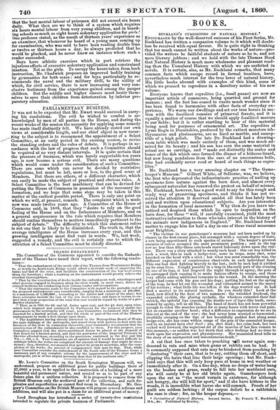THAMES EMBANKMENT.
The Committee of the Commons appointed to consider the Embank- ment of the Thames have issued their report, with the following resolu- tions—
" That the embankment of the north side of the Thames from Westminster Bridge to, or nearly to, Southwark Bridge would afford a desirable mode of improving the banks and bed of the river, and facilitate the construction of the low level sewer along the foreshore ; while a roadway on the embankment would greatly relieve the crowded thoroughfares. " That by the construction of docks inside the embankment wall, wharfingers and other persons engaged in business along the river would, in most cases, derive in- creased facilities for conducting their various trades and occupations. " That the statements made to the Committee with regard to the probable cost of the proposed embankment vary considerably, ranging from a minimum of 400,0001. to a maximum of 1,500,000/., according to the nature and extent of the plan ; but these estimates include the cost of the low level sewer ; and there is reason to ex- pect that a large proportion of the total first cost would be repaid by works of a pro- ductive character.
"That. as in 1861 the 8d. and id. duties upon coal, and the id. duty upon wine, which were imposed and continued by Parliament for the purpose of public im- provements in the metropolis will cease, your Committee recommend that they be renewed for a limited period, and that the whole or part of the cost of the Thames embankment be made a first charge upon them.
" The Legislature having already intrusted to the Metropolitan Board of Works the main drainage of the metropolis, and armed them with powers to deal with the foreshore of the river in connexion therewith, your Committee recommend that the construction of the embankment be also confided to them. For this purpose, your Committee suggest that the above-mentioned duties be placed at the disposal of that Board for a limited period, and that the guarantee of the Imperial Treasury be likewiae afforded them, according to the provisions contained in the 21st and 22d Vie., C. 104, s. 6. Your Committee are of opinion that it would be most difficult to estimate before the works are completed the amount of damage that might be occa- sioned; they, therefore, recommend that power be given to ascertain, after he com- pletion of the works, the amount of compensation that may be due. That, while your Committee consider the embankment of the South side of the Thames forms a necessary part of any complete scheme for the improvement of the river and the metropolis, yet is of less urgent necessity than that of the northern side."
Mr. Lowe's Committee on the South Kensington Museum will, we understand, propose an additional grant for public buildings there of 27,000/. a year, to be applied to the construction of a building of a more beautiful and permanent nature, and erected so as to be part of any future plan for a uniform collection. It is proposed to remove from the British Museum only the mediteval part of the collection, and such du- plicates and superfluities as cannot find room in Bloomsbury. Mr. Gre- gory's Committee on the British Museum will propose several reforms and additions, and will also put in a claim for an additional grant of money.
Lord Brougham has introduced a series of twenty-five reselutions intended to regulate the private business of Parliament.


























 Previous page
Previous page